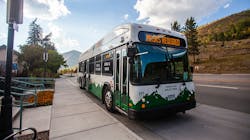Partnerships behind Vail’s electric bus transition
For mountain ski towns like Vail, Colo., climate change and warming temperatures pose an existential threat to the heavy snowpack on which the area’s tourism economy is based. To help reduce emissions, the town of Vail turned to Black & Veatch to upgrade its electrical systems as it prepares for 100-percent electrification of its public bus fleet.
Growing interest in high-efficiency, pollution- and emissions-reducing transit is propelling electrified mass transit projects across the United States. Against the pristine backdrop of the Rocky Mountains, Vail is among the first U.S. cities to begin full electrification of its diesel bus fleet. Certified under the Mountain IDEAL standard as a sustainable destination—the first mountain resort destination in the world to do so—the town of Vail has goals to reduce greenhouse gas emissions by 25 percent in 2025, 50 percent by 2030 and 80 percent by 2050.
Vail selected Black & Veatch to provide the consulting and pre-construction services required to prepare the town’s current facilities for conversion. GILLIG was selected as the bus manufacturer while ChargePoint was chosen as the charging station provider. Together, the partners helped deliver the town’s first four electric buses—the earliest of a planned 33 to be cycled into the public fleet—helping Vail achieve an important step toward its sustainability commitment.
“We chose to work with Black & Veatch on this project due to their experience and reputation of success in the field of electric vehicle charging,” said Greg Hall, director of public works and transportation for the Town of Vail. “In our work with them, their expertise and passion for sustainability really shone through, bringing added value and success to the project.”
Black & Veatch services included electrical system upgrades, technology consulting, a microgrid feasibility study, utility coordination, site survey, engineering and design services for the installations of the DC charging stations, environmental compliance, permitting service and construction quality assurance.
This first phase of the transition, which began in 2020, included converting the bus maintenance facility and depot to support the four GILLIG electric buses that joined the fleet and future-proofing the electrical and structural infrastructure of the facilities to ensure success as the rest of the fleet electrifies. With each bus in Vail’s fleet having a lifespan of about 12 years, full fleet electrification is expected by 2032 as electric buses are phased in to replace the town’s diesel fleet.
“As a company with a stated mission for decarbonization, Black & Veatch values working on projects that push our nation closer to net-zero carbon,” said Maryline Daviaud Lewett, director of business development at Black & Veatch. “Of course, we want to see electrification of transportation in all cities, but in a town like Vail with such delicate, pristine outdoor destinations and landscape, it feels especially right to be building clean, sustainable infrastructure.”
“This project is a great example of how GILLIG, ChargePoint and Black & Veatch work together to ensure our customer success," said Richard Bissell, GILLIG charging solutions manager.
